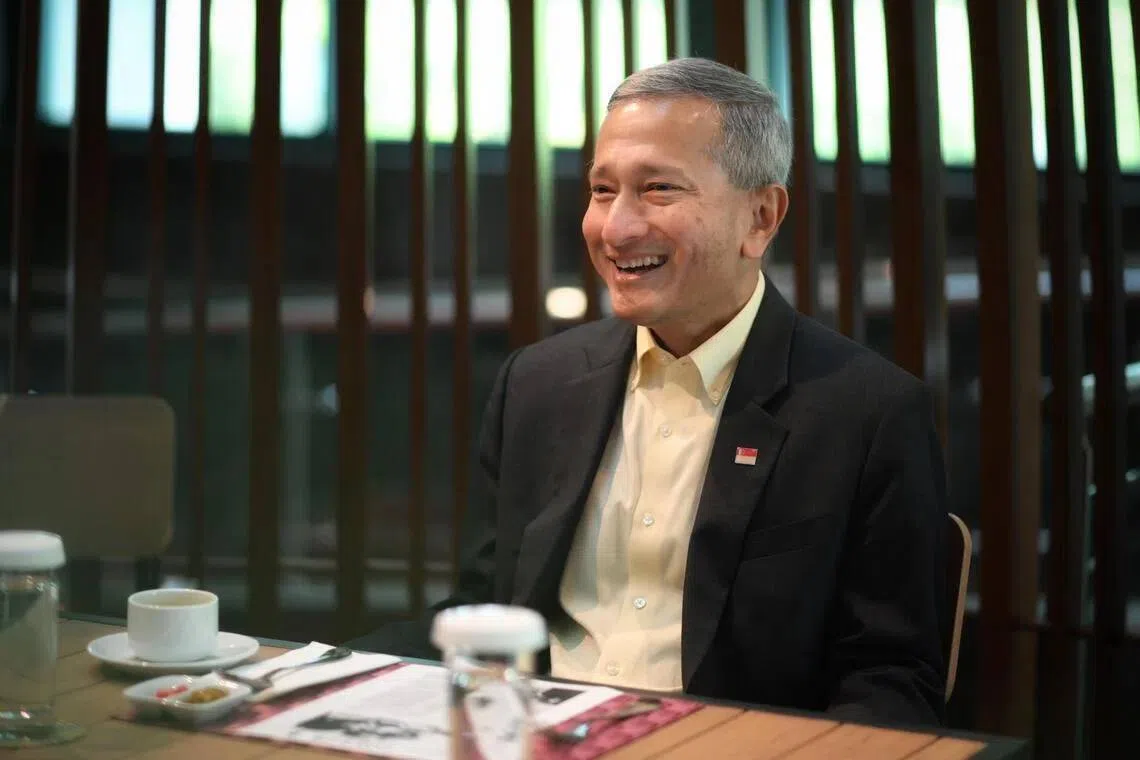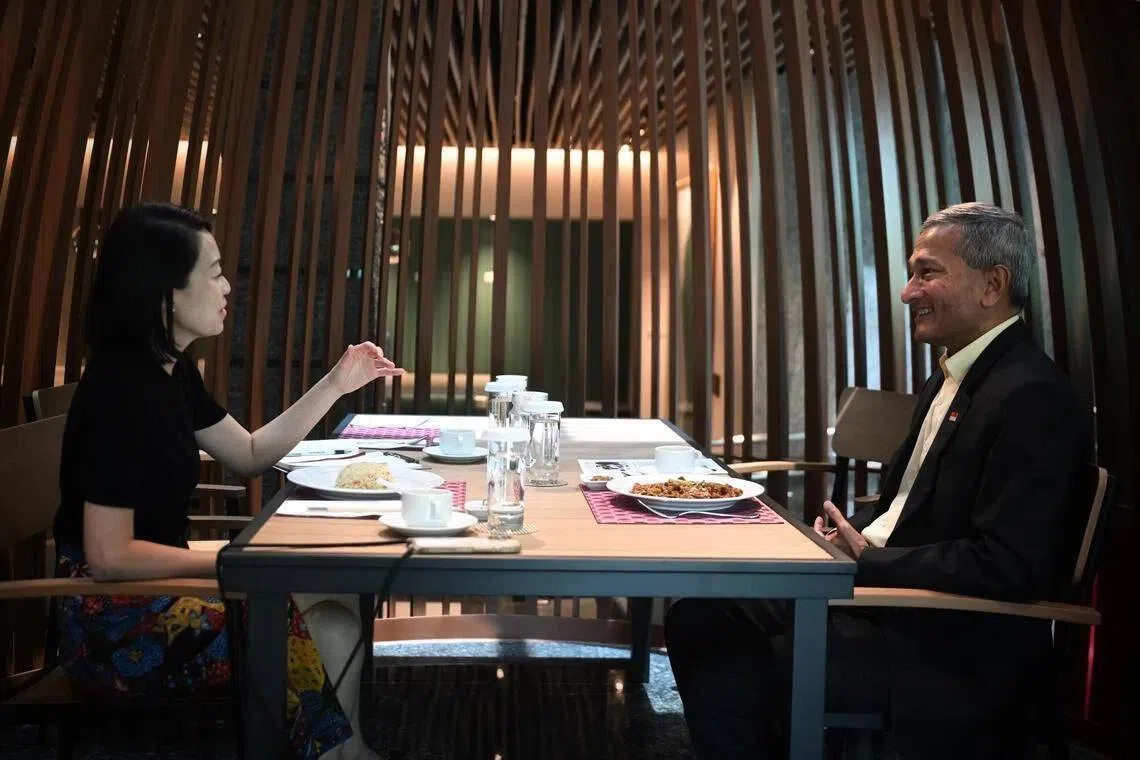‘Foreign policy now has domestic salience’: Vivian Balakrishnan on a decade of representing Singapore
In the House, more MPs are rising to query his ministry’s policies, whether during the annual Budget debate or the delivery of ministerial statements
[SINGAPORE] Of late, Singapore’s Foreign Minister has been directing much of his diplomatic energies to a different audience – those at home.
While his main focus is to represent the Republic’s interests abroad, Vivian Balakrishnan has also spent “hundreds of sessions” – he’s lost count – explaining Singapore’s foreign policy to Singaporeans. In the House, more MPs are rising to query his ministry’s policies, whether during the annual Budget debate or the delivery of ministerial statements.
“In the past, I would have had very few questions in Parliament,” says Balakrishnan. “(But) today, yesterday, or the last month, you can be on the front lines in Parliament, which means foreign policy now has domestic salience.”
It reflects how a certain emphasis in his work has, perhaps counterintuitively, shifted over the past decade. As the world becomes a more troubled one, “a lot of our diplomacy is focused domestically”.
“Because of our multiracial, multi-religious make-up, the truth is, when crises or conflicts break out in the world, it is very easy for us to view them through different lenses. And it is important that we achieve internal alignment, whilst recognising that different groups will feel more or less strongly about wars and conflicts elsewhere.”
And crises and wars and conflicts there have been aplenty in his time as Singapore’s top diplomat.
Navigate Asia in
a new global order
Get the insights delivered to your inbox.
On Oct 1, Balakrishnan marked 10 years in the role. That makes him one of Singapore’s longest-serving foreign ministers, alongside Professor S Jayakumar, who similarly helmed the portfolio for a decade, from 1994 to 2004. Old Guard leader S Rajaratnam left his indelible imprint, steering the young nation’s external relations from independence to 1980.
In an hour-plus interview with The Straits Times at the ministry building, Balakrishnan calls his tenure “an honour and a privilege”. It is also hectic. And one gets the feeling that the former eye doctor and university debating champion, who also spent time in ministries such as Environment and Water Resources, and Community Development, Youth and Sports, is fully in his element.

Not in S’pore’s interest to lecture others
The day before we met, the 64-year-old was deftly handling a flurry of questions in Parliament about the latest development in Gaza – US President Donald Trump’s 20-point peace plan – and Singapore’s take on it.
The Oct 7, 2023, attack by Hamas and Israel’s retaliation resulting in the ravages of Gaza have become one of the most heated issues in Singapore today, passionately debated by many across ethnic, religious and age groups. This includes those who want the government to take a stronger stance against Israel’s military operations, and to recognise Palestinian statehood now.
Singapore’s longstanding position is that it supports a negotiated two-state solution. Since the war broke out, it has made a slight, but distinct shift – it is prepared to recognise the Palestinian state when there is an effective government that renounces terrorism and also recognises the right of Israel to exist. Meanwhile, it is stepping up humanitarian aid as overland routes into Gaza open.
Meeting Singaporeans and staying “grounded” as foreign minister – as Balakrishnan puts it – is not just for the benefit of explaining the government’s views.
On whether it has taken on board domestic sentiments in formulating foreign policy, and if this is happening more in recent years, he says: “The answer is yes, and yes. The most recent and current example, obviously, is the problem in Gaza; it is a horrible tragedy. There’s no euphemism.”
The Republic’s position on the conflict takes its soundings from three national interests: maintaining unity, protecting its security, and abiding by international law.
Balakrishnan reiterates the need for Singapore to protect the space it has to respond should it ever come under an attack similar to that of Oct 7. “We’re not here to defend the Israelis, and we’re certainly not here to defend Hamas and the killing of civilians and the taking of hostages because that could happen to us. And when that happens, we will certainly respond. We will assert the right of self-defence.”
As for whether Israel’s actions amount to “genocide” – a position that some countries and the United Nations’ Independent International Commission of Inquiry have taken – the minister responds, in reference to the matter being brought before the International Court of Justice: “That’s for the court to decide.”
He acknowledges that there are Singaporeans who want Singapore to go further and faster. “For instance, people say, cut ties with Israel.
“Will that help me deliver more assistance? I think it will make it much harder.”
It is such performative actions that Singapore eschews, in line with what Balakrishnan describes as a key principle of its foreign policy – “to always have a very hard-nosed, realistic view of the world; that we are small, we are vulnerable”.
Yet, there is also a clear hunger among some Singaporeans for the power of gestures, symbolic though they may be, to underscore the values that they stand for.
Balakrishnan has some sympathy for this desire. “I think it is not unreasonable for people to say, ‘I want you – since you are my representative on the global stage – to reflect our identity, to reflect what we hold dear, and to reflect the principles upon which we organise ourselves.’”
But he stresses the risks of taking such an approach, drawing a clear distinction between a foreign policy based on principles, such as an adherence to international law; and that which is based on values, such as moral outrage over another government’s actions.
“I would say, I’m very cautious. For too long, Westerners have been lecturing us about how to organise our society, our social, cultural mores, our rules, whether we should have a death penalty et cetera, on this assumption that there is a single superior set of values.
“We don’t want external interference in how we organise ourselves, right? If I say I don’t want a lecture from others, I don’t go around lecturing other people too.
“But I am representing Singapore and Singaporeans to the extent possible, within the brutal hard-nosed realities of foreign diplomacy and strategic interests.”
To those who say that Israel’s actions have gone beyond the pale and now demand an absolutist moral response, the minister says: “Well, that’s a matter of degree. But have we said that this has gone on too long, too far, too much? Yes, we have. Have I told this directly to the Israeli leaders? Yes, I have.” He adds: “They cannot be pleased with it.”
“Will it make a difference? No, I don’t think what Singapore says is going to change the course of history. The issues are too complicated, too complicated, too deep.”

The way he sees it, the ability “to be clinical in these things” is especially pertinent in today’s fractured global landscape.
Over the years, the term “friendship” has gradually disappeared from Balakrishnan’s official lexicon – to avoid “over-personalising” diplomacy – and has been replaced by the word “partnership”.
“Now, what do you expect in a partner? Can you expect total agreement? You can’t. But do you demand honesty? You do. Do you demand reliability? You do.”
‘Equal opportunity’ response to US, China
In his political career, Balakrishnan has been noted for his communication and oratory skills. Lee Kuan Yew in 2006, while not naming anyone, singled out doctors as being the better communicators among the ruling People’s Action Party’s batch of new MPs in 2001.
Besides Balakrishnan, the other two medically trained fresh faces were Ng Eng Hen, the Defence Minister until he retired from politics in 2025, and the late Balaji Sadasivan, who was Senior Minister of State for Foreign Affairs.
The trio, along with Tharman Shanmugaratnam, Khaw Boon Wan, Raymond Lim and Cedric Foo, were dubbed the so-called “Super Seven” of 2001, for their immediate elevation into political office after the polls.
True to form, Balakrishnan turns up at the interview with “learning points” about Singapore’s foreign policy which, he says with a laugh, were percolating in his mind at 3am the night before.
Aside from the need for Singapore to be united and realistic, it has to be “very predictable”.
To a lesser extent than Gaza, the big-power rivalry between the United States and China – and what that means for Singapore – rouses domestic angst, and one question Singapore’s leaders often get is how the island-state can avoid picking a side. Balakrishnan’s answer lies in having a foreign policy consistently based on Singapore’s principles and long-term interests, and to communicate that diplomatically, carefully and accurately to both sides.
“If you understand our principles, you should be able to predict what we would say. And because both sides know that, there’s less pressure on us because we’re not the sort of country that gives in, can be bought or bullied.”
I ask him to elaborate on how this stance has informed Singapore’s responses to various developments in 2025. Specifically, I ask why the government took the unprecedented step of making public “advanced persistent threats” by cyber espionage group UNC3886 in July, though it did not identify the state actor behind it. Cyber security firms have linked the group to China.
The idea behind naming UNC3886, says Balakrishnan, was to signal to “whoever did it that we know, and we are prepared to speak up, and we’re prepared to take appropriate actions and precautions”.
Singapore has had prior cyber attacks, but this particular one was a very egregious hack into critical information infrastructure, he adds.
“Regardless of who this threat emanated from, we will do and say exactly the same. And this mode of response is equal opportunity.”
Other episodes, whether big or small, elicit responses undergirded by the same principle of equal treatment. These range from the US’ levying of a 10 per cent tariff rate on Singapore, prompting Prime Minister Lawrence Wong to characterise it as “not actions one does to a friend”, to the US embassy’s attempts to influence Singaporeans over the South China Sea conflict through what Balakrishnan describes as “not a very effective video”.
“Whatever example you bring up, I must be able to show that I would behave the same way. So it is the consistency of the response that is more important than whom I’m responding to.”

Links and bridges
In a world where rules are being rewritten by big powers, the space for small nations like Singapore can feel especially squeezed.
It is not just about a situation where “might is right”. Some worry if Singapore can remain as relevant and retain a seat at the table, especially relative to its neighbours’ growing in ambition and size.
“It’s tougher, yes, to show that we are relevant,” acknowledges Balakrishnan. But he points to Singapore’s growth as an advanced manufacturing hub and a global investor, saying: “On the other hand, it is not as if Singapore has not built up some strengths, which also give us some small say on the global stage.”
“And by the way, we’re not doing it alone,” he adds, citing Asean, the Forum of Small States and other multilateral networks.
Plans announced by PM Wong for Singapore to open new diplomatic missions in Africa and Latin America over the next few years, as part of the imperative to band together with like-minded partners, are on track, says Balakrishnan, though he declines to give details.
“What we’re assembling are links through trade and strategic alignment across the world. By making common cause, talking good sense consistently, we amplify our voice on the global stage.”
Ten years ago, negotiators hammered out the final details of the ambitious Trans-Pacific Partnership trade deal; Chinese President Xi Jinping and then Taiwan President Ma Ying-jeou shook hands in a historic meeting; and democracy icon Aung San Suu Kyi’s party won the elections in Myanmar.
In Singapore, a new foreign minister prepared for what was to come. Balakrishnan wrote on his social media account on Sep 28, 2015: “I have learnt that so many of the most pressing and complex challenges of the future will require patient but purposeful negotiations and deep collaboration with multiple stakeholders.”
With that and more on his mind, something’s got to give. The many overseas trips – he spends a quarter to a third of his time travelling – mean less time for his constituents in Holland-Bukit Timah GRC, something he has sought to mitigate by giving them his mobile phone number. When I ask what they call him about, he cracks a rare joke: “No prank calls.”
He is also a grandfather. The three older children by him and his wife, Joy, have seven children. Their youngest child, born when he was already in office, is now 19 and doing national service. But there has been grief too. On Dec 14, 2022, his daughter-in-law gave birth to a stillborn son. Balakrishnan was then accompanying then PM Lee Hsien Loong on an official visit to Kiel, Germany.
“So, I mean, yes, family time, obviously, has been compromised,” says Balakrishnan.
We move briskly on to other topics. I ask if there are other responsibilities he would want to try. In true PAP fashion, he demurs, saying: “It is not up to me.”
But he notes that he straddles both Singapore’s third-generation and fourth-generation leaderships. He says: “My main job now... is always to be a bridge to the next generation, and you want the Prime Minister to maintain a balance to keep preparing Singapore for the future.
“You need ministers to be functioning at that peak even as they hand over. That’s how you win a relay race.” THE STRAITS TIMES
Decoding Asia newsletter: your guide to navigating Asia in a new global order. Sign up here to get Decoding Asia newsletter. Delivered to your inbox. Free.
Copyright SPH Media. All rights reserved.

